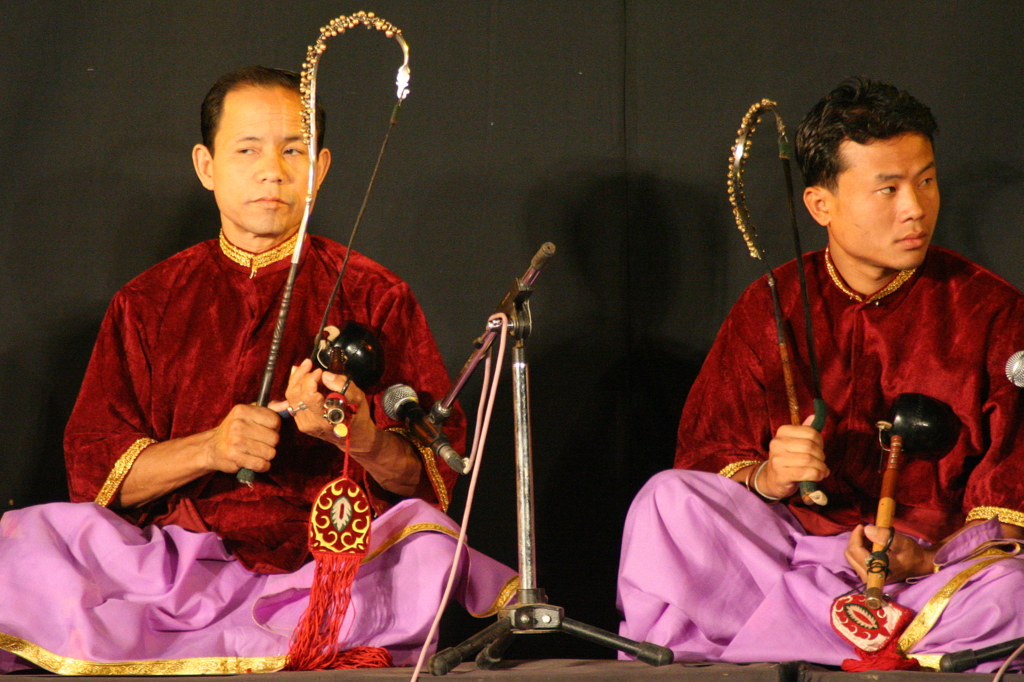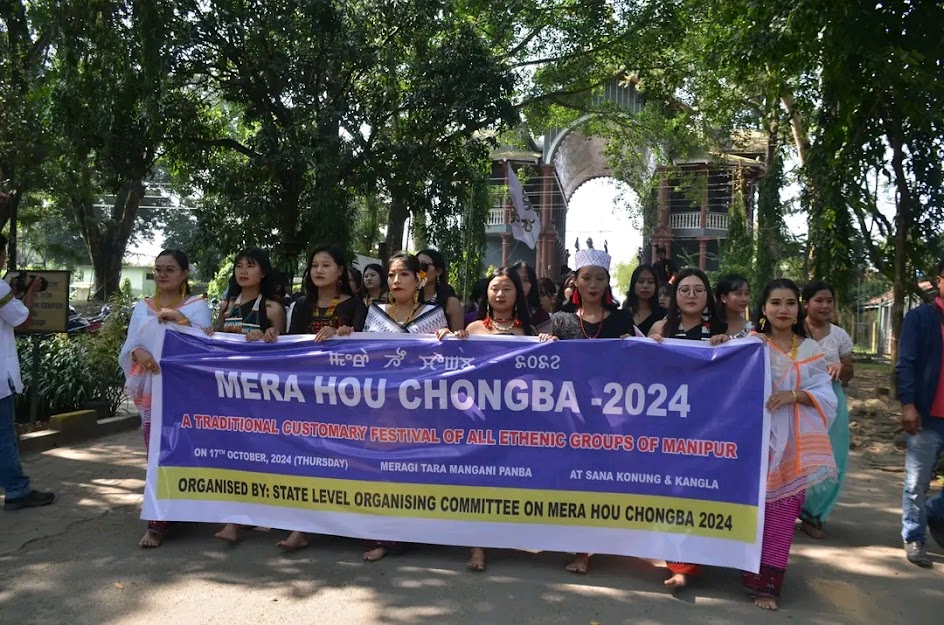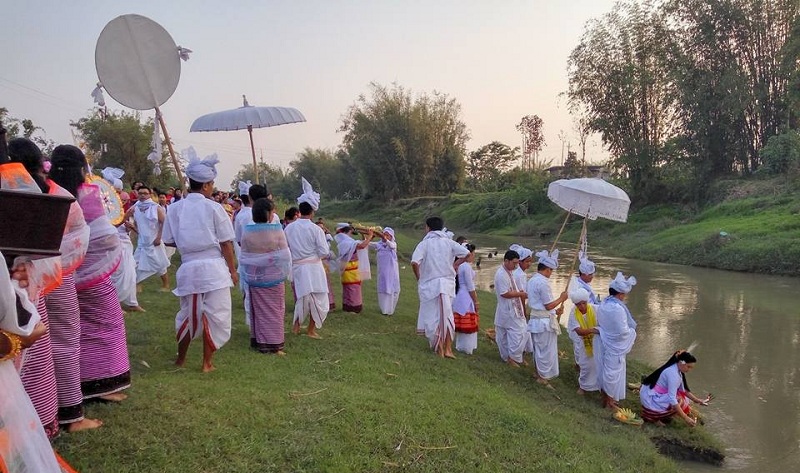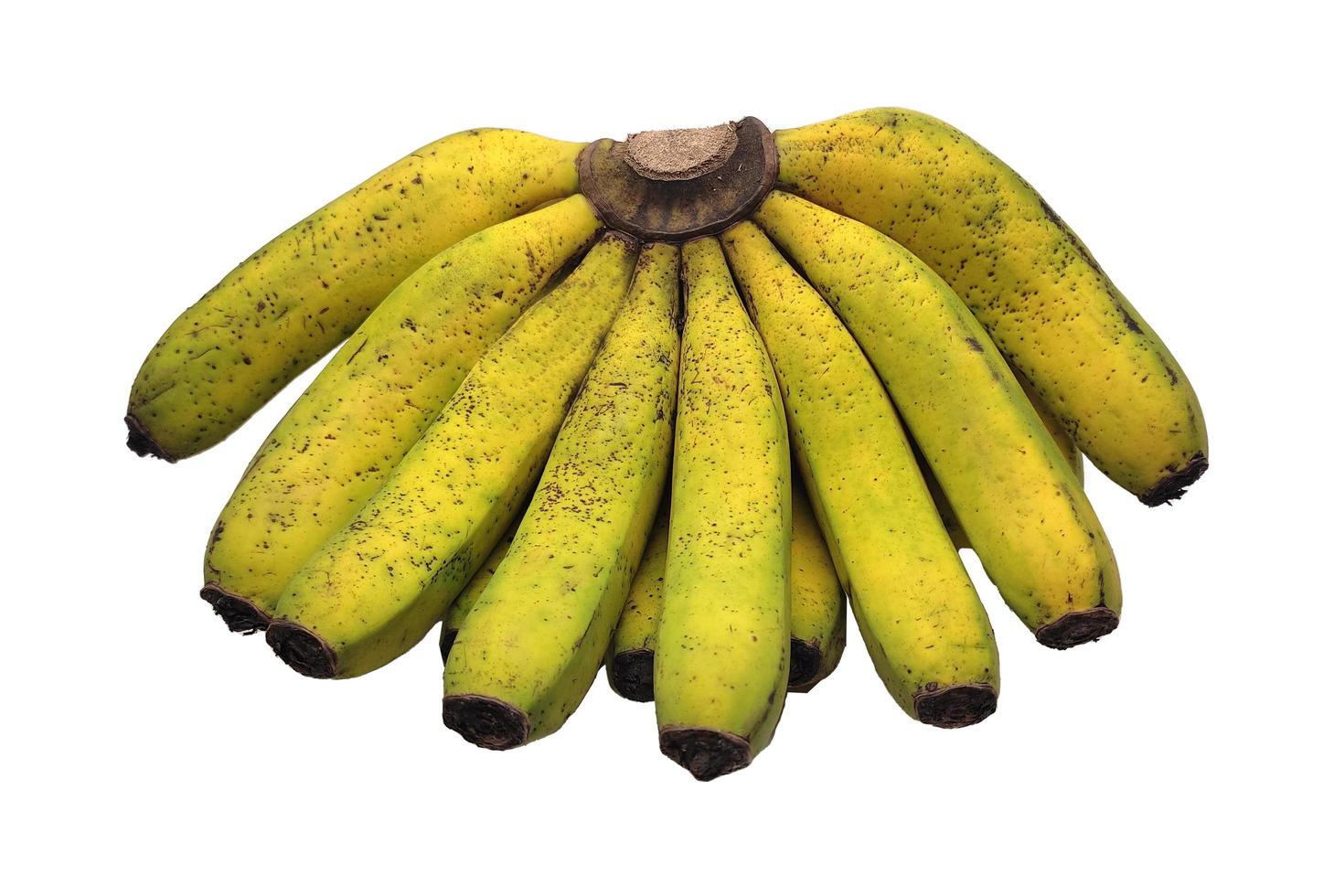Throughout history, foreign writers have often depicted Meitei kings as unfaithful, perpetuating discrimination and subjugation against other tribal communities in the region. To further this narrative, many immortal love stories between Meitei kings and women from the hill regions have been intentionally buried. However, the current situation requires resurrecting these tales, celebrating the immortal love sagas that have defined Manipur’s rich heritage. Among these remarkable stories is the enduring love saga of Meitei King Paikhomba and Maram Chanu Ingallei, a narrative that deserves recognition and appreciation by present and future generations.
Maram Chanu Ingallei, worshiped as Ima Langol Tarung Lairembi by Meitei
Maram Chanu Ingallei, who was believed to have been reincarnated as Ima Langol Tarung Lairembi has been worshipped by Meitei for the last 344 years. During the era of Cheithaba Sandham Tara (1679 AD), it was recorded that Meidingu Paikhomba visited the sacred shrine of Ima Tarung Lairembi. The king’s deep love for Ingallei remained undiminished, and he continued to yearn for her. Despite receiving messages from Amaiba and Amaibi on behalf of Ima Tarung Lairembi, they could not alleviate his longing. Paikhomba remained restless and immersed in sorrow over the loss of his beloved Maram Chanu Ingallei.
Paikhomba’s Pledge and Escape with Ingallei
Paikhomba, deeply in love with Ingallei, made a solemn promise to her, vowing that she would hold the esteemed position of Chief Queen in the Meitei palace. Their love led them to make a daring decision – to flee from Maram, carrying with them the sacred skulls of his fallen Meitei royal kin. This secret journey took them through dense forests, led by Ingallei, and aimed to get out of Karong. Ingallei understood the potential consequences if her father, the Maram Khullakpa, discovered their plan; it could mean her life or exile from her Maram village.
A Love That Withstood Challenges
In a time when Meitei kings were often depicted as unfaithful, these love stories challenged that narrative. The love between Meitei Ningthou Tabungba and her Tangkhul wife, and the saga of King Irengba and his wife Pidongnu Nungphabi, serve as examples of love transcending cultural differences. The story of Paikhomba and Ingallei is no different, symbolizing love’s triumph over adversity and discrimination.
Celebrating Extraordinary Sacrifices
Ingallei’s profound love for Meitei King Paikhomba led her to make extraordinary sacrifices. Her unwavering devotion, commitment, and the sacrifices she endured for her love challenge the stereotype of Meitei kings as unfaithful. Instead, they highlight the power of love to bring communities together, despite societal expectations and prejudices.
- Also Read: Do you know Meetei worships Tangkhul women
A Story for Present and Future Generations
Resurrecting the love saga of Paikhomba and Ingallei is not just an exercise in celebrating the past; it’s an opportunity to educate and inspire present and future generations. Their story serves as a testament to the enduring power of love and devotion and challenges stereotypes that have perpetuated discrimination in the region.
In reviving this love saga, we honor the memory of Ingallei and Meitei King Paikhomba, celebrating their love, sacrifices, and the legacy they left behind. It’s a story that reminds us of the strength of love, even in the face of adversity, and the potential for unity among diverse communities.
Historical Background
In 1666 AD, King Meidingu Paikhomba assumed the throne of Manipur, but his heart was restless, and his mind preoccupied. During his coronation at the young age of 20, he bore a solemn promise—to retrieve the skulls of his father and two brothers, which had been taken by the Maram Chief.
This tale harks back to the reign of King Khagemba, a time when a Maram Chief named Chabaikong was captured and brought to Kangla in 1644, only to meet his end in Sugnu. Seeking vengeance for his father’s death, Chabaikong’s son embarked on a quest that spanned nearly 20 years. In 1663 AD, King Khunjaoba dispatched his brother Tonnaba to Maram to collect tributes. When news of this expedition reached the Maram Chief, they prepared for retribution, resulting in a fierce battle that claimed the lives of Tonnaba and his two sons.
King Khunjaoba, ailing and incapacitated, summoned the young Paikhomba, who was a mere 20 years old, to share the tragic story of their family’s loss. Tonnaba was not just Paikhomba’s father but also his brother. Thus, in 1666, at the age of 21, Paikhomba ascended the throne, burdened by a burning desire for vengeance and justice.
The Enigmatic Mission
Paikhomba, consumed by his quest, embarked on a covert mission to Maram, assuming the guise of an orphan from the hill tribes. Stricken by his handsome, charming, and lovable appearance, the Maram Khullakpa adopted him as his own son.
Yet, infiltrating the Maram Chief’s residence, where the skulls of his father and brothers were held as war trophies, proved to be a herculean task. The Maram village was fortified, equipped with a large drum that could sound the alarm, along with a special bow and arrow gifted by Luwang Phunanba (Phunan Ningthou Telheiba).
Love Beyond Boundaries
Meitei Ningthou Paikhomba, residing in the house of his arch-enemy, the Maram Khullakpa, found his heart captivated by none other than Khullakpa’s cherished daughter, Ingallei. Paikhomba, bound by duty and burdened by the weight of their enmity, longed to express his feelings for Ingallei.
It was the unwavering devotion and profound love of Maram Chanu Ingallei that touched Paikhomba’s heart. Despite the adversarial circumstances, he could not conceal his affection for the daughter of his sworn foe. The courageous confession of his feelings to Ingallei, regardless of the potential consequences, reflected his genuine love.
Ingallei, having already given her heart and soul to the stranger from the valley, displayed remarkable courage and determination. She accepted Paikhomba wholeheartedly, without a second thought, and willingly offered her assistance to the man she loved. This extraordinary love story serves as a testament to the enduring power of love and the belief that love knows no boundaries or enmities.
A Solemn Promise
In a dream, Paikhomba’s deceased father, Tonnaba, instructed him to execute the plan and return to Kangla with Ingallei. This vision galvanized Paikhomba, and he confided in Ingallei about his true identity and purpose.
Paikhomba vowed to retrieve the skulls of his fallen family members and bring Ingallei along. He recognized two of the heads, and together, they secured the skulls and embarked on the arduous journey back to Kangla.
Yet, they faced a difficult choice. Paikhomba knew that accepting Ingallei in Kangla would challenge conventional norms and traditions, putting Meitei customs at risk. Despite his promises to her, the nobles and officials of the kingdom vehemently opposed this decision.
A Heart-Wrenching Parting
Upon reaching Karong Thingba, Ingallei chose to part ways with Paikhomba. She understood that Meitei society might never fully accept her as a Maram Chanu. Her decision was heart-wrenching but necessary to fulfill their shared destiny. Paikhomba asked Ingallei why she intended to return. She responded, “I am a Maram Chanu, and the Meitei will not accept me.”
Paikhomba reassured her, invoking Ibudhou Nongda Lairel Pakhangba with a solemn oath, emphasizing that Ingallei would forever hold the highest status of Leima in his heart.
A Challenging Journey to Kangla
Their journey to Kangla was arduous, with significant landmarks like Kurao Pokpi, where Ingallei served Tara Chayom to Paikhomba, holding historical value. Before entering Kangla, they found respite on the banks of the Imphal River, at a place known today as Chingmei Lomba (formerly Chingmeirong). This location, named Awa Kokna Hithathel, offered a breathtaking view of the Langol hill range.
Building Nongleng Shanglen and Upholding a Promise
Upon their arrival at Kangla, Paikhomba erected a regal palace, Nongleng Shanglen, for Ingallei. The Ukong Hongba ceremony was conducted to honor the spirits of Paikhomba’s departed father and two brothers.
Controversy and Sacrifice
As a part of internalized Meitei royal norms, it was traditionally unacceptable for a war prisoner to become a queen. Ingallei was initially brought to Kangla as a captive when Paikhomba ventured into Maram to retrieve the skulls of the royal clans. The reason for the protests from the followers against her nomination as Chief Queen was deeply rooted in this custom. However, had Paikhomba returned to Maram and successfully brought her back after this episode, it is likely that there would have been no objections or protests from the followers regarding the nomination of Maram Chanu Ingallei as the Chief Queen.
Paikhomba’s Decision and Ongoing Love
Despite his promise to Ingallei, Paikhomba eventually decided not to ascend the throne, as appointing Ingallei as the Leimarel Phamthol, the queen consort, would have revolt by the people. This choice caused him to distance himself from the administration of Kangla. However, his loyal followers, who believed in Paikhomba’s determination to uphold his promise, aimed to separate him from Ingallei in order to make him the king.
A Tragic Turn of Events
A significant moment occurred when Paikhomba went to the Makhel Thangal village to rescue his brother, Tangkhomba, who was on a mission to collect tributes. During his absence, miscreants set fire to Ingallei’s residence, Nongleng Shang, in the night. Ingallei cried for help, but no one came to her aid. Rumors suggested that she spent the entire night at Awa Kokna Hithathel, waiting for Meidingu Paikhomba. With no support, she ultimately climbed Langol Hill and disappeared from their lives.
Paikhomba’s Unchanging Love
Upon Paikhomba’s return, he desperately searched for Ingallei but was met with a sorrowful revelation from Lorembam Khongnangthaba and Maru Konok Thengra. They believed that Ingallei was no ordinary human, but rather the reincarnation of Ima Yumjao Lairembi, who had come to assist Paikhomba in fulfilling the promise made to King Khunjaoba. Despite marrying another woman in 1681, Haobam Chanu Ponglel Khombi, Paikhomba remained eternally devoted to Ingallei, keeping the vow that he would remain issueless.
An Eternal Yearning
Paikhomba’s longing for Ingallei remained unquenched. Despite subsequent marriages, his love for her endured, and the memory of their profound love remained etched in his heart.
The legend of Ingallei and Paikhomba is a testament to the enduring power of love, sacrifice, and destiny. Their story, set against the backdrop of Manipur’s rich folklore, continues to captivate the hearts of the women of Manipur, celebrating the strength of their ancestors and the enduring legacy of eternal love.
A Love Linking Meitei and Maram
The love saga of Paikhomba and Maram Chanu Ingallei defies the boundaries of culture and community. It transcends the constraints of time, making it a story for the ages. The extraordinary devotion and sacrifices made by Ingallei, a Maram girl, for her love, Meitei King Paikhomba, are etched in the annals of Manipur’s history.
Image credit – Luikang Robin via Pinterest
(C) Naorem Mohen
The Writer can be reached at Twitter @laimacha
Editor | Signpost News







